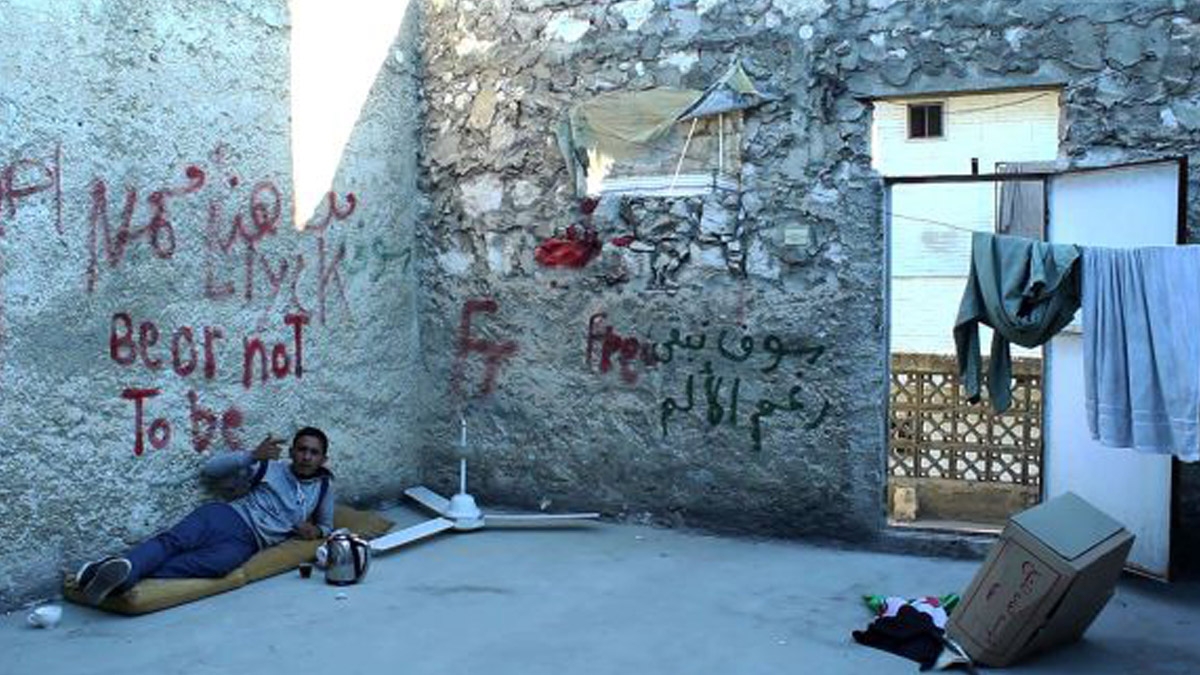Faraway, so close: filming distances
Lulu Shamiyya
300 Miles is a film that tells about distances. Orwa al Mokdad, the filmmaker, comes from Daraa, the hub of the March 2011 uprising. Like many young people from his generation, he cannot go back to his home town. The closest he can get inside Syria is to rebel-held Eastern Aleppo. The closest he can get is to a computer screen where he watches the innocent gaze of his eight-year-old niece Nour dialing in from Daraa. Through home-made videos uploaded for her young uncle she points out at “the destruction that is happening in Syria”.
Here's Daraa, southern Syria, a city where children do not go to school anymore. Instead, they watch their fathers dressed in military fatigues embracing kalashnikovs to protect their homeland against the brutality of a regime aiming to kill anyone who's not sharing his political views.
Here's Aleppo, northern Syria, a city that has been divided and destroyed by war and hatred. His young students who used to protest peacefully for human rights and a more dignified life now have to leave the university campus to extremist groups wanting to transform a place for knowledge into a place for submission.
In Daraa, Nour hangs out with her little portable camera to show Orwa the remainders of life. “You see, uncle, the tree that you used as a swing is no longer”.
In Aleppo, Orwa's restless camera follows a group of peaceful activists left alone with their ideals and very few other things: cigarettes, coffee, and a big disillusion vis-à-vis those who encouraged “the peaceful revolution”...Enthusiastic Western activists, NGOs, the facade of several governments, a high-principled yet totally paralyzed public opinion..those who supported the revolution until it fitted a nice TV shot, colorful street parades and chants, witty slogans and dances..until the revolutionaries seemed to be “like us”, no beards and secular-looking.. until it was convenient to invite these youth to drink tea and eat petit fours at a two-day workshop hosted in a five-stars hotel. Orwa's camera promptly captures the gaze of Adnan, one of the “respectful”, peaceful activists, while throwing a poster of a feel-good, dialogue-oriented conference on the floor, before being obliged to leave Aleppo with his comrades for the unknowns of exile.
Nobody can bear this hellish Aleppo, divided into opposition, regime, anti-regime, anti-opposition and god knows what. Nobody but Abu Yarub, a commander from the so-called “Free Syrian Army” that people barely remember. Orwa's camera patiently approaches him, trying to establish a dialogue with him. “Why are you still here, what are you fighting for”, he asks the stubborn commandant-in-chief who looks more and more like a Don Chisciotte fighting for an idea: the original, genuine idea of the revolution. But fighting whom? Fighting for what?
300 Miles is a film about distances. Not only geographical distances. Not only the distance dividing Orwa from little Nour, from his home town, that the magic of technology can bring closer, ghosts on the screen, blurred pixels animating the filmmaker's desire of homecoming.
A human distance. A distance marking the new geography of Syria. How far from each other are people like Abu Yarub, Adnan, Orwa himself? How far is the idea of a revolution which used to unite them all under a common ground, a shared ideal? How far is 2011 from the dark times that we are currently experiencing?
How far away is the time when we used to call it a “spring”; when we used to salute the energy of these grassroots movements and cherish their desire to change their world, our world? 300 Miles hints at this distance. A distance from an idea of a revolution which we ourselves, NGOs, respectful public opinion and governments, used to support until it was comfortable to do so, and which now we have left alone. Faraway, so close, Orwa al Mokdad's camera restlessly registers this failure: the failure of the images that have desperately tried to convince us spectators of the genuine face of an uprising. Nour is left alone uploading pixels and pixels of surreal daily life in Syrian, while Abu Yarub still fights against windmills, whether under the name of Isis or that of Bashar al-Asad. Adnan and his friends leave silently, walking toward exile, while Orwa's camera stays steady, trying to capture whatever life is left in his country descending into hell.



